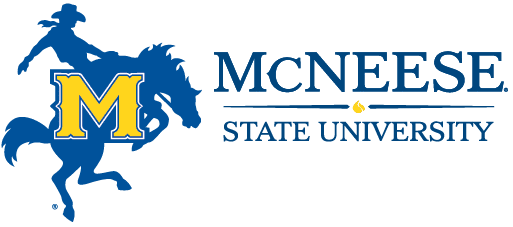Table of Contents
Academic Year 2023-2024
The University’s 84th academic year was one of tremendous progress on facilities, campus infrastructure, long-term planning, and fiscal health. Projects, plans, and programs began that will shape and transform the McNeese campus over the next 18 months.
At the August 8 annual General Faculty and Staff Meeting, Dr. Burckel reported, “We have over $100 million in projects in various construction, planning, and design stages. Some of these projects are a result of the 2020 hurricanes. The damage to the campus was extensive, but it presented incredible opportunities for us to reimagine what our campus can become.”
These projects include a new bookstore, new football press box, repair and renovation of the President’s House, relocation of the McNeese Autism Program to a permanent facility, and the LNG Center of Excellence.
Due to the severe impact of the 2020 hurricanes, FEMA approved plans and funding to demolish Farrar Hall and Memorial Gym, resulting in revised design plans for the new Student Union.
Other projects include Contraband Bayou Phase II from the Richard Rhoden Bridge to Ryan Street, renovations to the Shearman Fine Arts Building, and the repair of the exterior of the Burton Business Center Building.
Dr. Burckel reported on the tremendous progress made to campus buildings and infrastructure over the past 12 months.
The first phase of the Contraband Bayou Improvement Project from Common Street to the bridge was completed. This resolved a serious erosion problem on both sides of the bayou and transformed a very unsightly section of campus into a beautiful park-like setting.
The Richard Rhoden Bridge across Contraband Bayou connects Student Central, residence halls, and student apartments to the main campus.
A building at the foot of the Rhoden Bridge, between Frazar Memorial Library and Kirkman Hall, was renovated and refurbished for University Police operations.
Bulber Auditorium was repaired and reopened. Several academic labs were built or refurbished, and numerous buildings were updated with exterior cleaning and painting and interior renovations.
Landscaping throughout campus was restored and refreshed. New street banners, building banners, LED exterior lighting, and street signs were installed. Technology infrastructure was hardened with more cyber security initiatives in place.
The new Student Health and Counseling Center opened in shared space with an Ochsner CHRISTUS Urgent Care that is available for employees and students.
The new campus housing management partner made significant improvements to residential housing—including long needed repairs and renovations, new security features for entrances, and updated landscaping. Dr. Burckel reported campus housing was at 90% occupancy before classes began.
New offerings and enhancements that impact the student experience were completed, including an E-sports lounge in the Rec Complex and updated furniture in Rowdy’s Cafeteria along with new menu and improved hours of operation.
“At the center of all of these projects,” Dr. Burckel said, “is our goal of being a student-centric campus throughout our classrooms, campus, and culture.”
He also reported that 2023 Legislative Session included an appropriation for a 2 1/2% raise for faculty and unclassified staff. Civil Service employees also received salary or position adjustments.
Dr. Burckel also announced the Guiding Vision for the Future that was developed with input provided by more than 100 on-and-off campus stakeholders at the 2022 Focus on the Future Conference.
The Guiding Vision for the Future is a blueprint with purpose and intent that includes Six Vision Themes that will be used to decision-making and planning for the next five years:
- Focus on Significant Academic Program Continuous Process Review
- Sustainable Recruiting & Retention
- Internal & External Communications
- Employee Training & Morale
- Physical & Digital Infrastructure
- Community Engagement
During the 2023-2024 academic year, faculty, staff, students and community members worked together to develop goals and strategies for these initiatives that will:
- provide the highest level of academic experiences and student services,
- strengthen our community relationships,
- meet the future employment needs of our region, and
- continuously improve the quality of life in Southwest Louisiana.
There was also a serious topic to discuss at the beginning of the new academic year. The impact of declining enrollment and its impact on the operating budget.
During the spring 2023 semester, the leadership team held 12 town-hall type meetings open to all faculty and staff to discuss the impact of declining enrollment on the operating budget. With nearly 80% of the operating budget reliant on student tuition and fees, the decline in enrollment since 2019 had translated into a $9.5 million loss of self-generated revenue. By August, the projected operating deficit for the 2023-2024 fiscal year was $4 million.
Declining enrollment was not a problem unique to McNeese. Colleges and universities across the country were facing the same issue. Since 2017, the nine universities in the University of Louisiana System experienced a decline of 11%, or nearly 10,000 students.
During the town hall meetings, Dr. Burckel presented a three-year plan to balance the budget and eliminate the deficit through reductions in expenses and a limited amount of available one-time funding.
On March 6, 2024, at the monthly Administrative Advisory Council meeting, Dr. Burckel announced that the current year budget was balanced, the deficit erased, and the remainder of one-time state appropriation funding will be carried forward and available as needed.
Using a combination of higher than projected revenues, reductions in expenses, the reorganization and consolidation of some units and offices, and moving some units out of the operating budget that are self-sustaining, Dr. Burckel and his team needed just one year, not three, to balance the budget and return the University to solid fiscal footing.
“Enrollment remains a priority,” Dr. Burckel said, “and the most immediate opportunity to increase revenue will always be through increasing retention rates. Retaining the students already in our classrooms is critical to creating a sustainable and enduring future for our University.”
During the 2023-2024 academic year, McNeese partnered with EAB to implement retention initiatives and provide information and tools on best practices in student success, retention, and student data analysis. Faculty, staff, and students have embraced the new concepts and communication tools, and there is great optimism these initiatives will lead to higher retention rates.

